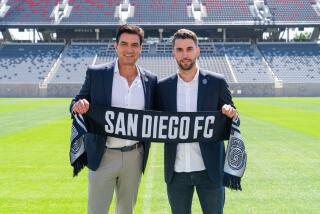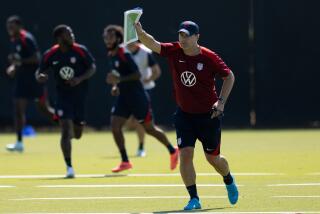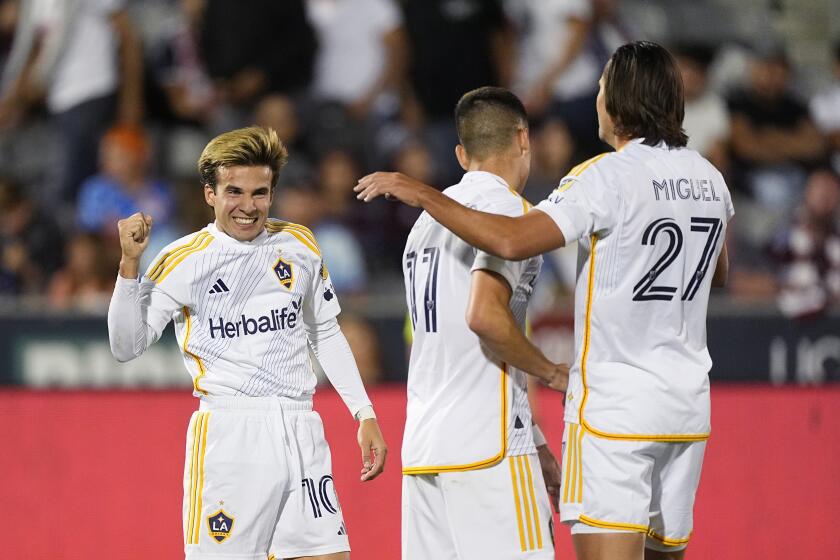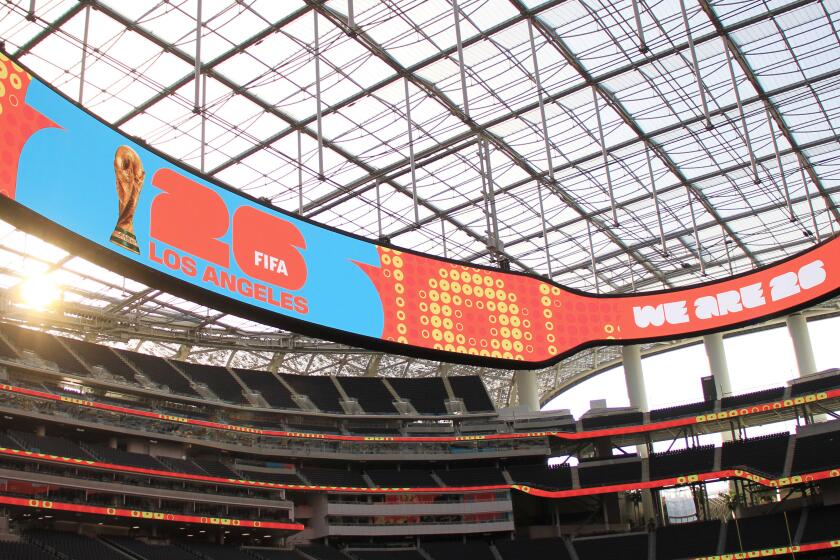FCA’s Popejoy Under Fire at Annual Meeting : Chairman Is Key Target as Shareholders Voice Anger Over Recent Heavy Losses
In an unusually acrimonious annual meeting Tuesday, angry stockholders of Financial Corp. of America directed a fusillade of criticism at FCA Chairman William J. Popejoy in the wake of the firm’s disastrous financial performance in the past year.
The verbal assault followed an opening statement in which Popejoy indicated that there was only a “remote chance” that shareholders would be compensated if FCA’s insolvent American Savings & Loan subsidiary is bought by private investors led by Texan Robert M. Bass.
By a voice vote, shareholders approved a proposal to establish an independent stockholders’ group, to be funded with $1 million in FCA money. Popejoy said the board of directors would consider the proposal but later told reporters he doubted that FCA would fund the effort.
Chairman’s Pay an Issue
FCA shareholders have seen the price of their common stock plunge from a high of $17.25 in 1986 to less than $2 in the wake of $531 million in losses since the start of 1987. Those losses wiped out FCA’s stockholder equity and American Savings’ capital. FCA’s stock closed unchanged Tuesday at $1.125.
“Take a pay cut or step down,” one unidentified stockholder yelled at Popejoy, who received $539,717 in cash compensation in 1987. “All of our working capital . . . went down the tubes in the last nine months,” said another shareholder, who identified himself as Richard Meyer and said he had suffered heavy losses on his FCA investments. “How could that happen?”
The crowded and raucous meeting, attended by 325 people and lasting 2 1/2 hours, was held at the Irvine Marriott in Orange County, just across the street from FCA’s corporate offices. The company’s only substantive possession is American Savings, which has 185 branch offices in California and ranks as America’s second-largest thrift with its $30 billion in assets.
In responding to the anger, Popejoy displayed varying degrees of sympathy, apology, candor and defensiveness. Federal thrift regulators installed him as chairman and chief executive of FCA nearly four years ago at the zenith of a terrifying deposit run that nearly put American Savings into receivership.
“I don’t apologize for one thing we have done in the past four years, but I am sorry we didn’t turn the company around,” the 50-year-old chief executive said. “. . . . To that extent, we failed.”
Son’s Salary Questioned
Popejoy blamed recent heavy losses on rising interest rates and accelerating loan problems on real estate development projects in Texas and central California. “We didn’t know the extent of the problems four years ago, three years ago, two years ago, that we see today,” he said.
Popejoy bristled when asked about the employment of his 30-year-old son, Parry, who is a vice president of American Savings and earned $72,681 last year.
Popejoy defended his son’s experience and background, saying the first time he knew of the salary was when he “read about it in the Wall Street Journal.” Actually, the salary was first disclosed in the proxy statement sent to shareholders in advance of the annual meeting.
To be sure, not all shareholders were critical. “If we would just be a little more patient, this baby will turn around,” said one Popejoy stalwart. “I’m pretty sure of it.”
As its financial condition has deteriorated, American Savings has become a virtual ward of the federal government, with all key shots being called by the Federal Home Loan Bank Board in Washington.
Its immediate future now depends on pending negotiations between the bank board and private investors led by Bass, who reportedly have agreed to ante up between $500 million and $600 million in capital to assume the healthy assets of American Savings.
But the prospect of selling American Savings with no compensation to FCA shareholders outrages people like John D. Turner, who spearheaded the shareholder assault at the annual meeting.
Turner, 54, who lives in San Jose, said he has suffered losses of more than $700,000 on his 90,000 shares of FCA stock after paying an average price of $9 a share. “It’s a mess,” Turner said after the meeting, “a scandalous mess.”
Turner wants the independent shareholders’ group to study the possibility of suing the Federal Home Loan Bank Board for allegedly hiding American Savings’ true financial condition. Popejoy, however, said that using FCA money to fund a shareholder lawsuit against the bank board would not fly too well in Washington.
If that happened, and “if I were the chairman of the bank board,” Popejoy said, “I’d say (to the FCA chairman): ‘You’re out, your board’s out, and I’m putting you into receivership.’ ”





